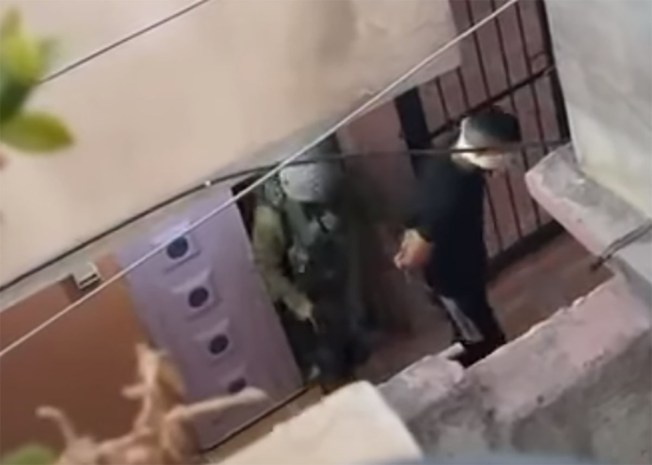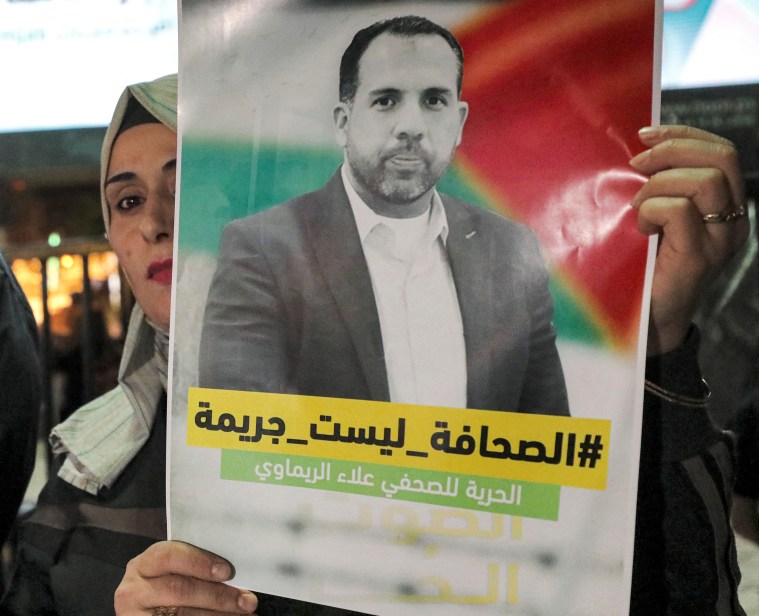In October, when the Israel-Gaza war began, Alaa al-Rimawi snapped into action, covering developments on J-Media, the West Bank-based news agency he directs, as well as on TikTok and Facebook. But his conflict coverage would be short-lived. Less than two weeks after the start of the war, Israel banned J-Media on security grounds and quickly arrested three other J-Media employees. On October 19, al-Rimawi met the same fate. He was undergoing a medical examination at a hospital when Israeli forces raided his home in Ramallah, detaining his son to pressure al-Rimawi to turn himself in. Later that day, al-Rimawi surrendered himself at nearby Ofer Prison.
“As you know, the occupation, in time of its war on Gaza, now wants the journalistic and media voice to be absent,” al-Rimawi said to his more than 229,000 TikTok followers before he reported to prison. “I apologize, I apologize because I may not be with you in this coverage and convey your pain, wounds, and victory, with God’s help.”
Al-Rimawi is one of 17 Palestinian journalists held by Israel in CPJ’s most recent prison census, which provides a worldwide snapshot of journalists behind bars on December 1, 2023. There are no Israeli journalists on the list, nor is anyone held by Palestinian authorities. This is the highest number of media arrests in Israel and the Palestinian territories since CPJ began tracking imprisonments in 1992. (The prior record was in 2016, when Israel held seven Palestinian journalists, and in 2011, when Israel held four Palestinian journalists and Hamas held three.) By contrast, there was just one Palestinian journalist in Israeli custody at the time of CPJ’s previous census. Globally, Israel is now the sixth worst jailer of journalists, tied with Iran.
More in this report:
Analysis: Jailed journalists near record high in 2023
Video: Misusing and abusing the law
Interactive map: Attacks on the Press
The steep increase underscores just how dangerous the Israel-Gaza war is for journalists across the Palestinian territories. Gaza, where Israel has maintained a strict military blockade since 2007, is by far the most perilous place to be a journalist, with many dozens killed in Israel’s airstrikes and invasion following Hamas’s October 7 attack on Israel. But all of the journalists imprisoned in the war in CPJ’s census are from the West Bank, territory Israel has occupied since 1967. (Gaza journalist Diaa Al-Kahlout, for example, was not included on CPJ’s list because he was arrested after the December 1 cutoff.) Reporting from the West Bank poses a set of unique risks, including attacks by Israeli settlers and Israeli and Palestinian law enforcement, and, increasingly, Israeli military arrests. Palestinian journalists and advocates describe these detentions as a form of censorship.

“It is a way to silence them, violating their right to expression, political participation, and journalistic work,” said Tala Nasir, a lawyer with the Palestinian prisoner support group Addameer. “They don’t want the Palestinians, the journalists, to show the world all of these crimes.”
Like the majority of journalists on CPJ’s list, al-Rimawi has not been charged. He and the three other J-Media journalists, as well as 10 others are held in administrative detention, a policy with legal roots in British controlled Palestine. Unlike Israeli civilians, who are tried in the country’s civilian court system, West Bank Palestinians are subject to military courts. Under administrative detention, a military commander may detain an individual without charge to prevent them from committing a future offense. The detention period, typically six months, can be extended an unlimited number of times, during which judges may accept evidence without disclosing it on security grounds, according to the Israeli human rights group B’Tselem.
Family members of several journalists, including al-Rimawi, told CPJ that they believe that their relatives are being held because of their social media posting, but they can’t say with certainty. According to Nasir, families of all detainees – not just journalists – are receiving scant information these days, and some don’t even learn that their relatives were arrested until days after the fact. Prior to October 7, two family members were allowed at military court hearings for defendants facing charges; now none are permitted, said Nasir. Access to lawyers has been impeded; court sessions are now primarily held via video conference, which makes it difficult for lawyers to speak privately with their clients.
Two journalists on CPJ’s list, Tarek el-Sharif and Mohammad al-Atrash, have been charged with incitement, which typically carries a sentence of six months to two years, according to Addameer, the prisoner support group. El-Sharif is the host of the popular West Bank call-in show “With the People.” After October 7, he provided daily updates for his listeners on Israel’s military response, discussing airstrikes in Gaza and the Palestinian death toll with local callers. In November, he was arrested in a dawn raid on his home. According to Nasir, who has been following his case, el-Sharif faces two charges of “glorifying martyrs,” or people Israel alleges to be terrorists, on episodes of his radio show. Al-Atrash, host of the show “People’s Discussions” on Radio Alam was charged over posts on Facebook and Instagram, his lawyer told the radio station.

An Addameer representative recently visited the el-Sharif in Ofer Prison, outside Ramallah, and he described abysmal conditions. He is allowed just 15 minutes of yard time every other day. Each week, he receives a bottle of shampoo shared among prisoners to clean their bodies and clothes; to disinfect their cells, they use a cup of diluted chloride. He also said he was beaten during his arrest and by prison authorities; at least four other journalists on CPJ’s list were also allegedly beaten in custody.
Journalists make up a small number of the thousands of Palestinians who have been arrested in massive sweeps since October 7. “They are arresting former prisoners, political leaders, activists, university students, and journalists,” said Nasir. Most of the journalists on CPJ’s list were arrested in raids on their homes, during which authorities sometimes seized cell phones. All but six had faced prior arrest by Israel, a pattern which Nasir said reflects broader trends. J-Media’s al-Rimawi has been arrested multiple times, including in 2021 when he staged a hunger strike in protest; an Israeli army spokesman accused the journalist of being a Hamas operative at the time. (Two of the journalists on CPJ’s list had also been arrested by Palestinian security in the past.)
Israeli authorities “know they are activists, they have a political point of view,” Nasir said of detainees. Israel, for its part, has said it is targeting militants with its arrest campaign. The Israeli military directed CPJ to contact the country’s security service, known as the Shin Bet, for comment on imprisoned journalists, but it did not reply.
With every journalist arrest, newsgathering diminishes. Since October 7, Oday Al-shobaki, who reports for the Palestinian Authority-run Palestine TV, has seen his reporting community shrink. He noticed that administrators on a WhatsApp group for local journalists began deleting phone numbers and later learned that they belonged to people who had been arrested. The deletions were a precaution in case Israeli soldiers seized the journalists’ phones when they were taken into custody.
Al-shobaki said he got into journalism to “raise the Palestinian voice high,” and used to relish traveling the West Bank for stories. But since the war began, he has avoided going into the field, or even into his office, opting to work from his home in Bethlehem. He relies on images and videos recorded by eyewitnesses, but he believes many stories have been missed.
Nasir, the lawyer, said that Palestinians don’t trust military courts to set journalists or other prisoners free, but she hopes that some may be let out in exchange for hostages held by Hamas in the October 7 attack. Two journalists, Mervat Al Azze and Lama Khater, were already released in recent swaps.
If and when journalists are freed, Al-shobaki predicts they won’t shy away from returning to the profession. “I think most of them when they get home will start working again,” he said.
Additional reporting by Ignacio Delgado Culebras and the CPJ Middle East and North Africa program staff.
